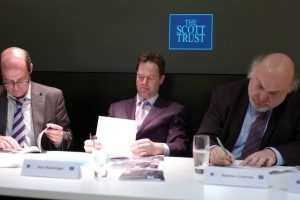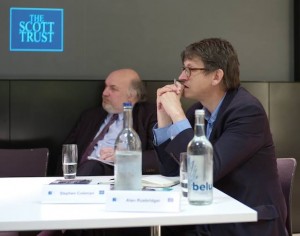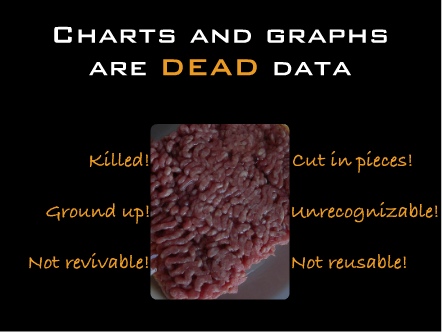Yesterday I went to London for the launch of a research report from the Reuters Institute for the Study of Journalism on Public Trust in the News written by Stephen Coleman, Scott Anthony and David E. Morrison. Because the research was part-funded by the Scott Trust, which owns the Guardian and the Observer (for which I write), the event was held in the Guardian‘s posh new offices next to King’s Cross station, an area hitherto notorious mainly for whores, pimps and drug pushers but now clearly coming up in the world. On the landing outside the Scott Room (where the launch was held) is a bust of ol’ C.P. himself (author of the famous observation that ‘comment is free but facts are sacred’, often bowdlerised nowadays as ‘columnists are expensive but facts are even more so’), so we were all on our best behaviour.

The Report
The subject of the research was the hoary old question of “trust in the media” (yawn) but the investigators had done us the honour of at least trying something new.
First of all, they avoided the traps of older lines of inquiry which focussed on either production (how journalism engenders or repels public trust) or consumption (how audiences receive and evaluate the news) and looked at both production and consumption.
Secondly, rather than asking audiences how much they trust the news and journalists how much they feel they should be trusted, the researchers asked audiences: what is news? How should the news media be expected to perform? “By shifting our investigation from trust, as a measurement of accpetance, to expectation, as a register of how the public thinks it ought to be served, we have allowed the public to elaborate a basis for confidence in the news”. They apply a fancy social-scientific label to this approach — ‘constructivist’ — to denote that the definitions of trust and the news were ‘constructed’ by participants in the study rather than by the researchers. They argue that this approach reveals “that trust in the media amounts to rather more than confidence in journalistic accuracy. It involves feelings of a kind that accord the media a legitimate place in the social ordering of the world” (whatever that means). The researchers declare, in a superior tone, that trust in the veracity of the media — measured by the extent that people think they are telling the truth — is “a relatively trivial exercise in understanding”. What is required, they say, “is a critical examination of how people construct the function of the news media”.
The third point of departure from Ye Olde Researches, they declare, is that their study is “contextual”. By this they appear to mean that the focus groups meetings on which the analysis rests were discussing three big news stories: the Obama-Clinton battle in the US presidential election primaries; the ‘disappearance’ of Shannon Matthews; and Mohammed al-Fayed’s bizarre conspiracy theories about the death of Princess Diana.
What did they glean from these focus groups (beyond the astonishing discovery that not a single participant knew that Obama and Clinton belonged to the same political party)? Well, basically that
“people have several expectations from the news, including the provision of useful information that supports them in their personal and civic lives, reliable information that provides ontological assurance in an insecure world and amusing informaiton that offers guilty [sic] distraction from the anxieties of the serious world. News is valued to the extent that it meets some or all of these expectations. The news fails when it devalues [?] these expectations”.
The conclusion seems to be that there are two contradictory trends in the “production, circulation and reception of public knowledge” that raise issues of trust.
The first is a nagging suspicion that journalists and the media are, so to speak, on an ‘inside track’ — inside what BBC DG Mark Thompson called “the charmed circle of knowledge and power” (aka the ‘Westminster village’?) This convinces citizens that an unbridgeable gap exists between them and the centres of power in our society.
The second trend is the influence of networking technology — “peer-to-peer knowledge-sharing, user-generated news content and grass-roots mashing-up of official information at the democratic epicentre of public knowledge”. [Hmmm… this is windy verbiage: how can you have an ‘epicentre’ of a distributed phenomenon?] The report contends that “The traditional Production-Distribution-reception model of news transmission has been radically disrupted by notions of co-production, dispersed circulation and vernacular rearticulation”. However, this seems to pose a problem for the focus groups. “The vastness of the internet, the abundance of news sources and the fragmentation of online public space has left them more ucertain than ever about their capacity to access or act upon the kind of information that might help them to become free and self-governing citizens”.
So what’s to be done? The report argues that journalists need to take on a “mission to connect”, a windy phrase which seems to involve constructing four principal “linkages”:
between contextual back-stories and current events
between citizens and institutional processes of policymaking
between citizens and the confusing mass of online as well as offline information sources
between communities and communities
The Debate

There were three speakers — Nick Robinson, Political editor of the BBC; Nick Clegg, Leader of the Liberal Democrats (formerly the Claret Appreciation Society); and Professor Stephen Coleman, lead author of the report.

Proceedings were chaired by Alan Rusbridger, Editor-in-Chief of the Guardian.
First up was Stephen Coleman who lost no time in impressing upon us the originality of his team’s approach and the importance of their conclusions, esp in relation to the “mission to connect”.
Coleman was followed by Nick Clegg, looking natty in a sharp suit and pink tie. He candidly explained that he had conscientiously prepared for the event by making a careful study of an entirely different RISJ report, and so his remarks on Professor Coleman’s labours would have to be extempore. For this he gained many brownie points with the audience, unaccustomed as its members are to honesty from a politician. For a time he waffled, but eventually got onto firmer ground when he talked about how recent canvassing experiences had given him an insight into the extent to which citizens lived in ‘micro-climates’ of concerns undreamed-of by Westminster politicians. They are, for example, incredibly worked up about something that the mainstream media regards as a tired old story — the closure of local post offices. And very exercised about a topic long ago declared a no-go area for ‘responsible’ media — immigration. And about mental health. He cited these three areas as examples of profound disconnection between local and mainstream-media mindsets.
Finally, Nick Robinson came to the rostrum. He was terrific — no other word for it. In part this is because his job requires him to be definite and succinct. But it was mainly due to the candid and open way that he approached the topic of the research. He said that he had read the report and found himself nodding in agreement all the way — until he reached the conclusions. And he clearly saw problems in the area of ‘making connections’. How, for example, does one explain the back-story in a Ten O’Clock News item lasting, say, 2′ 45″? He used as an illustration of the problems the case of the MPs’ expenses saga. He had done the back-story — about eight months ago. How could he be expected to pack it in every time? (This point was taken up later by Stephen Coleman, who argued that TV political news makes very little use of the red button — in comparision to the imaginative uses to which it is put by sports programmes.) He also had interesting things to say about the points raised earlier by Nick Clegg. On immigration, for example, he felt that the liberal media had believed for too long that the subject was mainly of interest only to loony right-wing groups. Whether this was due to liberal ‘denial’ or sheer absence of insightful opinion research is not clear. There was polling evidence, he said, but editorial establishments across the high-IQ media didn’t like the evidence. So, he said, the media “explained but didn’t connect” on this subject.
Another case where this may have happened was that of women in the workplace.
Robinson was sceptical about the ‘crisis of authority’ thesis, citing examples of really big stories or crises when people automatically turn to trusted old-style media for information. “When the chips are down”, he said, “people know where to turn”. And in general that is the BBC.
He also said, en passant that he had given up reading the comments on his blog because they were often so rude, intemperate and unthinking. (Thinks: so much for the ‘marketplace in ideas’. But actually oafish commenting is largely a product of allowing people to comment anonymously. When people have to be accountable for what they say, they are better behaved. That’s why I’ve always thought that the BBC and the Guardian were mad to allow anonymous commenting.)
Overall, it was an interesting and worthwhile evening. For me there were eerie echoes of the arguments about the Birt-Jay “mission to explain” in the 1980s, which in turn went back to Walter Lippmann and his view about the role of the press in early 20th-century America. Like Lippmann, Birt believed that the function of journalism was not to “pick at the scabs of society” but to convey to citizens the complexities of the decisions that have to be made by a sophisticated, industrialised society. (Lippmann went so far as to argue that the function of the press was to “manufacture consent” of the governed to decisions made in their name.) He and Peter Jay articulated this view brilliantly — and implemented it in a major, well-funded, current-affairs series on LWT — but the thesis (and indeed Birt himself) ran into the vigorous opposition of journalists who were temperamentally and intellectually hostile to the notion that they had a constructive (or consent-manufacturing) role to play in the polity. My hunch about Coleman’s “mission to connect” is that it will run into the same kind of opposition — assuming, of course, that there any journalists around to have a view on this, or indeed anything else.







